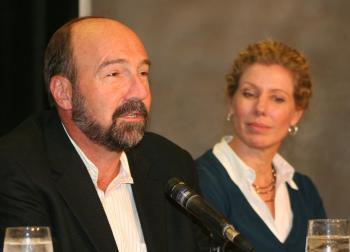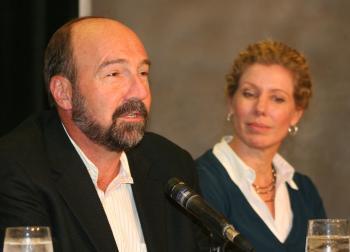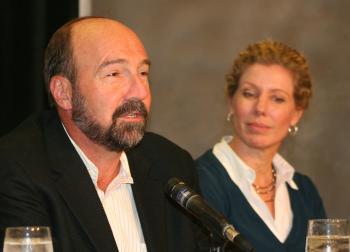WASHINGTON, D.C.—News coverage has changed considerably in the last two decades, revolutionizing the world of journalism. Anyone seeking a career in journalism today is stepping into an evolving stream of technological innovations, multimedia capability, and interactive news reporting. These developments are a huge leap from when text and print were the dominant means of news transmittal.
The National Press Club hosted a symposium on the nature of the journalism as it is practiced today and how to get a foothold in the job market.
In the evening of Oct. 14 in the Eric Friedheim National Journalism Library of the National Press Club, around 30 budding journalists—some already working in the field—came to learn from three highly accomplished journalists: Kathryn Kross, television chief at Bloomberg News; Neil Budde, founding editor and publisher of the Wall Street Journal (WSJ) Online; and Amar Bakshi of the Washington Post.
The first two were veterans in the field, while the latter has just launched his career, as a “backpack journalist,” and has acquired some well-deserved kudos for his innovative style.
Kathryn Kross, who spent her career predominately in broadcast news, recalled the days when there were three main networks, serving the news needs of 40 million viewers out of a U.S. population of 225 million, and “they were all feeding from the same informational trough.” Kross began her career two decades ago at the Washington bureau of ABC news when it was owned by Disney. Then CNN entered the news scene.
“Chicken Noodle News, we called it. No one took it seriously. [While] its viewing audience was small, [CNN] completely changed the rules of the game, changed what we do. Instead of waiting for the evening, you were surrounded by news all day long.”
Later, Kross would become CNN news bureau chief.
Neil Budde, who left the WSJ Online—the largest paid news site on the Internet—and became editor-in-chief of Yahoo! News, where he encountered Kevin Sites. Budde said “Kevin Sites in the Hot Zone,” is an example of the new style of news, which all three of the guest journalists admired greatly. Sites came to Budde with a proposal to provide Yahoo! an intimate, behind-the-lines view of the Iraq War. He got the job and became Yahoo!’s first news correspondent, working alone without a crew.
At first, Budde said it took an inordinate amount of time for Sites to combine the “words, photos, and video” into reports and he was exhausted after completing a report. Gradually, he got into a productive method that since has made him a success, said Budde. In the last five years, he has been covering most every conflict in the world.
Referring to the multimedia coverage and the new kind of reporting such as Sites’, Kross put it this way: “For those who enjoy the buzz at the moment, it’s a great high.”
Indeed, Sites started something. He sent back reports from such troubled areas as Iraq, Afghanistan, Colombia, Indonesia, and Lebanon. From Budde’s description and the Yahoo! website, one gets a highly romantic picture of this new approach to news on the Internet, reaching out to a global audience.
“As a solo journalist (‘SoJo’), Sites carries a backpack of portable digital technology to shoot, write, edit, and transmit multimedia reports,” says Yahoo!
The National Press Club hosted a symposium on the nature of the journalism as it is practiced today and how to get a foothold in the job market.
In the evening of Oct. 14 in the Eric Friedheim National Journalism Library of the National Press Club, around 30 budding journalists—some already working in the field—came to learn from three highly accomplished journalists: Kathryn Kross, television chief at Bloomberg News; Neil Budde, founding editor and publisher of the Wall Street Journal (WSJ) Online; and Amar Bakshi of the Washington Post.
The first two were veterans in the field, while the latter has just launched his career, as a “backpack journalist,” and has acquired some well-deserved kudos for his innovative style.
Kathryn Kross, who spent her career predominately in broadcast news, recalled the days when there were three main networks, serving the news needs of 40 million viewers out of a U.S. population of 225 million, and “they were all feeding from the same informational trough.” Kross began her career two decades ago at the Washington bureau of ABC news when it was owned by Disney. Then CNN entered the news scene.
“Chicken Noodle News, we called it. No one took it seriously. [While] its viewing audience was small, [CNN] completely changed the rules of the game, changed what we do. Instead of waiting for the evening, you were surrounded by news all day long.”
Later, Kross would become CNN news bureau chief.
Neil Budde, who left the WSJ Online—the largest paid news site on the Internet—and became editor-in-chief of Yahoo! News, where he encountered Kevin Sites. Budde said “Kevin Sites in the Hot Zone,” is an example of the new style of news, which all three of the guest journalists admired greatly. Sites came to Budde with a proposal to provide Yahoo! an intimate, behind-the-lines view of the Iraq War. He got the job and became Yahoo!’s first news correspondent, working alone without a crew.
At first, Budde said it took an inordinate amount of time for Sites to combine the “words, photos, and video” into reports and he was exhausted after completing a report. Gradually, he got into a productive method that since has made him a success, said Budde. In the last five years, he has been covering most every conflict in the world.
Referring to the multimedia coverage and the new kind of reporting such as Sites’, Kross put it this way: “For those who enjoy the buzz at the moment, it’s a great high.”
Indeed, Sites started something. He sent back reports from such troubled areas as Iraq, Afghanistan, Colombia, Indonesia, and Lebanon. From Budde’s description and the Yahoo! website, one gets a highly romantic picture of this new approach to news on the Internet, reaching out to a global audience.
“As a solo journalist (‘SoJo’), Sites carries a backpack of portable digital technology to shoot, write, edit, and transmit multimedia reports,” says Yahoo!






